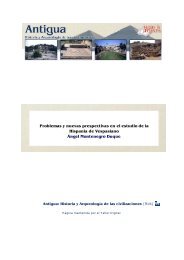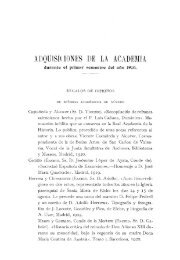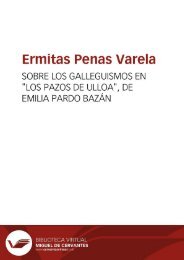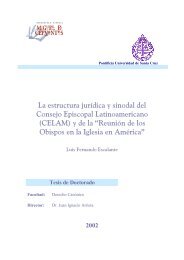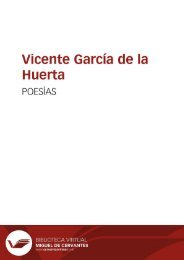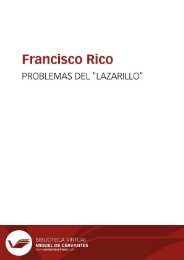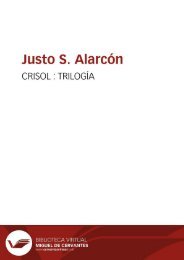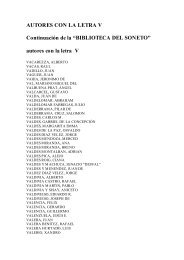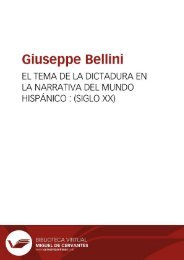Create successful ePaper yourself
Turn your PDF publications into a flip-book with our unique Google optimized e-Paper software.
Anales galdosianos [Publicaciones periódicas]. Año XII, 1977<br />
With fiction's complexity thus posited, the ensuing irony is less jolting: at the very moment when<br />
Máximo awakens from a dream to a recognition of the creative power of rational consciousness, he<br />
also becomes fully aware (Chs. XL and XLII) of his loss of power over his creations. The autonomy<br />
of events and characters from their creator and the chasm that exists between them, as well as the<br />
illusion of reality that this autonomizing process bestows on the fiction, are expressed in words that<br />
could not have been lost on Unamuno: « Después de tal inverosimilitud, viene la más grande y<br />
fenomenal de todas las de aquel día. Esta sí que es gorda. Estoy seguro de que nadie que me lea tendrá<br />
tragaderas bastante grandes para ella; pero yo la digo, y protesto de la verdad de su mentira con toda<br />
mi energía » (XL, 251).<br />
Manso's narration also draws attention to itself as fiction through the device of contrasting its<br />
potential and its actual course. Immediately after confronting Manuel about his relationship with<br />
Irene, the narrator sets up a dichotomy between what the conventions of sentimental literature would<br />
demand under the circumstances and the strange truth of his reactions:<br />
No puedo, al llegar aquí, ocultar un hecho que me pareció entonces, y aún hoy me lo parece,<br />
rarísimo, fenomenal y extraordinario. Bien quisiera yo, al contar que comí, aparecer conforme con lo<br />
que es uso y costumbre en estos casos, es decir, pintarme desganado y con más ánimos para vomitar el<br />
corazón que para comerme un garbanzo; pero mi amor a la verdad me impone el deber de manifestar<br />
que tuve apetito, y que comí como todos los días. Bien se me alcanza que esto resulta en contradicción<br />
con lo que afirman los autores más graves que han hablado de cosas de amor, y aun los fisiólogos que<br />
han estudiado el paralelismo de las funciones corporales con los fenómenos afectivos; pero sea lo que<br />
quiera, como pasó lo cuento, y saque cada cual las consecuencias que guste.<br />
(XXXIX, 242-43)<br />
The reader of these lines is forced into an open consideration of the literary art; he becomes ally to<br />
the narrator in passing judgment on conventions that run contrary to the realities of life; and he is<br />
prevented from sentimentalizing the action by having his attention thrust on the mechanism of the<br />
narration exactly as Manso's craving for food brakes his emotional response. When that response does<br />
arrive, it has been rendered as bookish as the books under attack. 142<br />
142 Further such instances are a scene with Doña Cándida concerning Irene: « Me rodeaba una<br />
atmósfera de drama. Presentía la violencia, lo que en el mundo artificioso del teatro se llama la<br />
situación » (XXXV, 217); and after José María's sheepish retreat from Irene's quarters: « No había<br />
habido drama, cosa en extremo lisonjera para todos » (XXXVI, 227). In another work, such comments<br />
104




